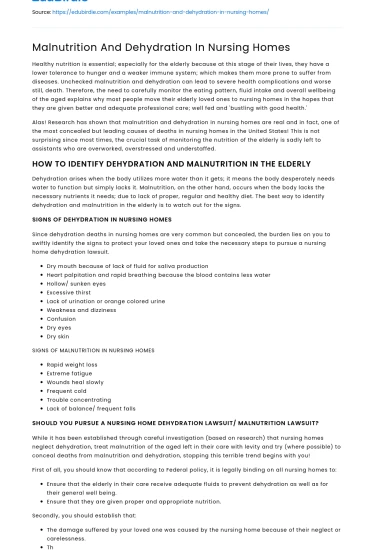Healthy nutrition is essential; especially for the elderly because at this stage of their lives, they have a lower tolerance to hunger and a weaker immune system; which makes them more prone to suffer from diseases. Unchecked malnutrition and dehydration can lead to severe health complications and worse still, death. Therefore, the need to carefully monitor the eating pattern, fluid intake and overall wellbeing of the aged explains why most people move their elderly loved ones to nursing homes in the hopes that they are given better and adequate professional care; well fed and 'bustling with good health.'
Alas! Research has shown that malnutrition and dehydration in nursing homes are real and in fact, one of the most concealed but leading causes of deaths in nursing homes in the United States! This is not surprising since most times, the crucial task of monitoring the nutrition of the elderly is sadly left to assistants who are overworked, overstressed and understaffed.
Save your time!
We can take care of your essay
- Proper editing and formatting
- Free revision, title page, and bibliography
- Flexible prices and money-back guarantee
HOW TO IDENTIFY DEHYDRATION AND MALNUTRITION IN THE ELDERLY
Dehydration arises when the body utilizes more water than it gets; it means the body desperately needs water to function but simply lacks it. Malnutrition, on the other hand, occurs when the body lacks the necessary nutrients it needs; due to lack of proper, regular and healthy diet. The best way to identify dehydration and malnutrition in the elderly is to watch out for the signs.
SIGNS OF DEHYDRATION IN NURSING HOMES
Since dehydration deaths in nursing homes are very common but concealed, the burden lies on you to swiftly identify the signs to protect your loved ones and take the necessary steps to pursue a nursing home dehydration lawsuit.
- Dry mouth because of lack of fluid for saliva production
- Heart palpitation and rapid breathing because the blood contains less water
- Hollow/ sunken eyes
- Excessive thirst
- Lack of urination or orange colored urine
- Weakness and dizziness
- Confusion
- Dry eyes
- Dry skin
SIGNS OF MALNUTRITION IN NURSING HOMES
- Rapid weight loss
- Extreme fatigue
- Wounds heal slowly
- Frequent cold
- Trouble concentrating
- Lack of balance/ frequent falls
SHOULD YOU PURSUE A NURSING HOME DEHYDRATION LAWSUIT/ MALNUTRITION LAWSUIT?
While it has been established through careful investigation (based on research) that nursing homes neglect dehydration, treat malnutrition of the aged left in their care with levity and try (where possible) to conceal deaths from malnutrition and dehydration, stopping this terrible trend begins with you!
First of all, you should know that according to Federal policy, it is legally binding on all nursing homes to:
- Ensure that the elderly in their care receive adequate fluids to prevent dehydration as well as for their general well being.
- Ensure that they are given proper and appropriate nutrition.
Secondly, you should establish that:
- The damage suffered by your loved one was caused by the nursing home because of their neglect or carelessness.
- The damage suffered by your loved one is significant enough to warrant a lawsuit.
Regardless of how significant you feel the injury may be, you can save the life of your loved one and by extension, the entire population of vulnerable elderly people in nursing homes by reporting any sign you notice. This starts with constant random visits during meal times to observe and pay attention to the signs.
Do not hesitate to take appropriate legal steps if you notice that your loved one is suffering from malnutrition and dehydration in a nursing home due to neglect because silence may degenerate to something fatal− death.






 Stuck on your essay?
Stuck on your essay?

